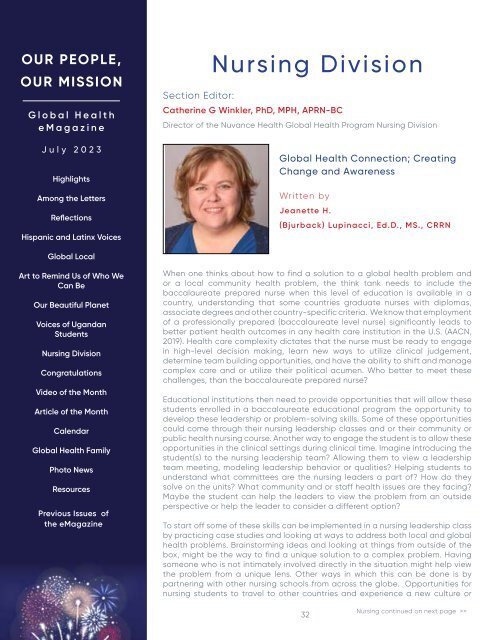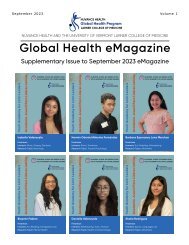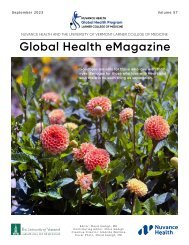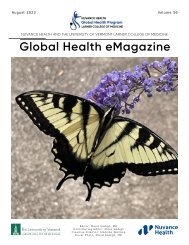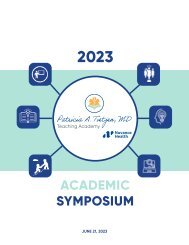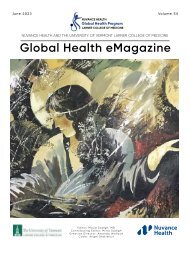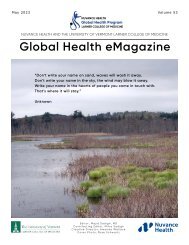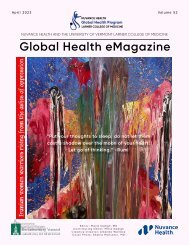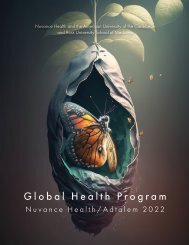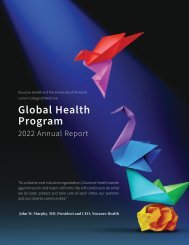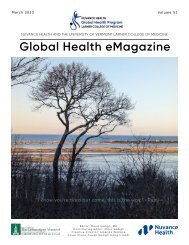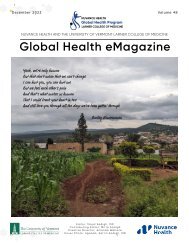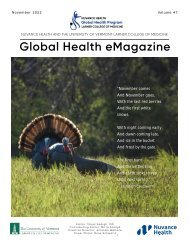eMagazine July 2023
Create successful ePaper yourself
Turn your PDF publications into a flip-book with our unique Google optimized e-Paper software.
OUR PEOPLE,<br />
OUR MISSION<br />
Global Health<br />
<strong>eMagazine</strong><br />
<strong>July</strong> <strong>2023</strong><br />
Highlights<br />
Among the Letters<br />
Reflections<br />
Hispanic and Latinx Voices<br />
Section Editor:<br />
Nursing Division<br />
Catherine G Winkler, PhD, MPH, APRN-BC<br />
Director of the Nuvance Health Global Health Program Nursing Division<br />
Global Health Connection; Creating<br />
Change and Awareness<br />
Written by<br />
Jeanette H.<br />
(Bjurback) Lupinacci, Ed.D., MS., CRRN<br />
Global Local<br />
Art to Remind Us of Who We<br />
Can Be<br />
Our Beautiful Planet<br />
Voices of Ugandan<br />
Students<br />
Nursing Division<br />
Congratulations<br />
Video of the Month<br />
Article of the Month<br />
Calendar<br />
Global Health Family<br />
Photo News<br />
Resources<br />
Previous Issues of<br />
the <strong>eMagazine</strong><br />
When one thinks about how to find a solution to a global health problem and<br />
or a local community health problem, the think tank needs to include the<br />
baccalaureate prepared nurse when this level of education is available in a<br />
country, understanding that some countries graduate nurses with diplomas,<br />
associate degrees and other country-specific criteria. We know that employment<br />
of a professionally prepared (baccalaureate level nurse) significantly leads to<br />
better patient health outcomes in any health care institution in the U.S. (AACN,<br />
2019). Health care complexity dictates that the nurse must be ready to engage<br />
in high-level decision making, learn new ways to utilize clinical judgement,<br />
determine team building opportunities, and have the ability to shift and manage<br />
complex care and or utilize their political acumen. Who better to meet these<br />
challenges, than the baccalaureate prepared nurse?<br />
Educational institutions then need to provide opportunities that will allow these<br />
students enrolled in a baccalaureate educational program the opportunity to<br />
develop these leadership or problem-solving skills. Some of these opportunities<br />
could come through their nursing leadership classes and or their community or<br />
public health nursing course. Another way to engage the student is to allow these<br />
opportunities in the clinical settings during clinical time. Imagine introducing the<br />
student(s) to the nursing leadership team? Allowing them to view a leadership<br />
team meeting, modeling leadership behavior or qualities? Helping students to<br />
understand what committees are the nursing leaders a part of? How do they<br />
solve on the units? What community and or staff health issues are they facing?<br />
Maybe the student can help the leaders to view the problem from an outside<br />
perspective or help the leader to consider a different option?<br />
To start off some of these skills can be implemented in a nursing leadership class<br />
by practicing case studies and looking at ways to address both local and global<br />
health problems. Brainstorming ideas and looking at things from outside of the<br />
box, might be the way to find a unique solution to a complex problem. Having<br />
someone who is not intimately involved directly in the situation might help view<br />
the problem from a unique lens. Other ways in which this can be done is by<br />
partnering with other nursing schools from across the globe. Opportunities for<br />
nursing students to travel to other countries and experience a new culture or<br />
32<br />
Nursing continued on next page >>


